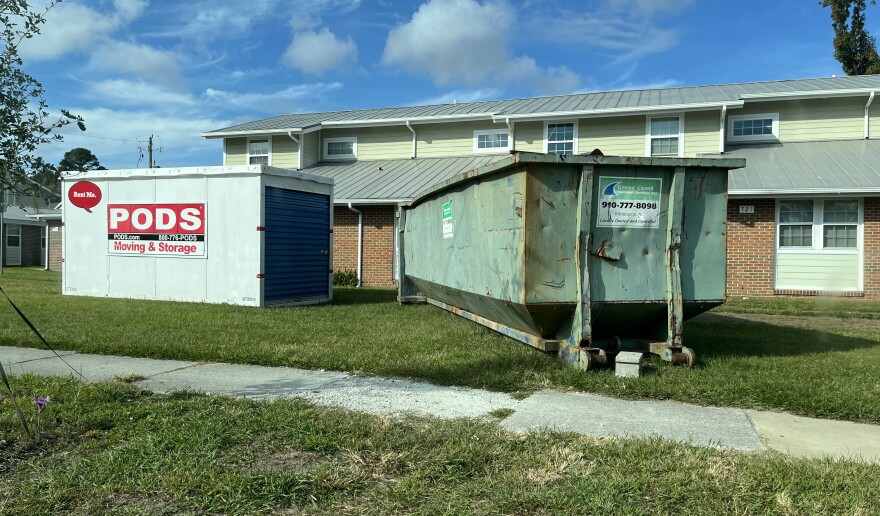Displaced residents have hit another setback: they'll be receiving less financial help from Wilmington Housing Authority from now on.
WHA residents who are displaced to hotels and corporate apartments are given a per diem payment to help them manage increased food and transportation costs caused by the displacement. More than 150 families, including hundreds of children, have been displaced from their apartments and homes since last year because of a long-neglected mold crisis in the Wilmington Housing Authority.
Historically, per diem payments were $60 per adult per day, with lower payments for children. But now, leadership at the public housing authority have halved those payments to cut costs.
Executive Director Tyrone Garrett made the decision, and says it’s to make sure the authority can afford to house the residents in hotels until their apartments are safe to live in.
Read More: WHA’s new executive director, Tyrone Garrett, discusses past controversies and future challenges
"Bad news oftentimes comes before the good news," Garrett said. "And so I think we're working pretty hard and diligently to get us to the to the finish line before the end of the year."
WHA had been using capital funding to cover per diem and hotel costs, but the U.S. Department of Housing and Urban Development (HUD) recently informed the authority it would need to find another path by July.
The authority requested help from the City of Wilmington and New Hanover County, and received a total of $3.3 million from those local governments. But the funding is still oriented towards repairing the moldy apartments.
Read More: New Hanover County loans Wilmington Housing Authority $1.65 million, joining city
"So capital money is money that can only go towards the remediation effort or rehabilitation of the units, there's no soft money on included in that," Garrett explained. Even with a few hotel residents tapping into the county's remaining rental assistance funding, WHA is facing a tight budget now that the capital fund is closed.
"Reducing [the per diem] allows us to continue to manage it as best as we possibly can," Garrett said. "But the reality of it is that no resident who's currently in a hotel is going to lose that hotel stay. They're still going to be housed on for as long as they need to be housed."
Now that HUD has stopped the authority from using those capital funds, it'll need to switch to using money from its operational budget. And with the summer tourist season and inflation, the hotel stays can only be increasing in cost.
Residents are upset to see the loss of half their income, especially with inflation. Amber Bragg, who’s been displaced with her four kids and her partner for more than a year, said even the per diem they used to receive didn't always cover every meal and the gas it took to take her kids to school.
"It's a ripoff," Bragg said. "I feel like the money that they give us we have to live on. It costs a lot to live out of a hotel. I mean, a lot.”
After mold destroyed all her family's possessions, she needed extra help to buy replacement clothes and other basic needs. And for 15 months, she’s had to feed her kids from restaurants because the hotel room has no kitchen, and her children are completely sick of fast food, she said.
"Sometimes I would l go to a friend's house and cook maybe like some baked beans and sausage are fresh and little chicken drumettes," she said, but there's not a lot of fridge space in her small hotel room.
Several other residents have noted their hotels have policies against hot-plates or other ways to cook in their rooms.
Latorche Jones was moved out of her home shortly after giving birth — her son, who has grown up in a small hotel room, is now one year old.
"It's sad how they're doing us. They get to go home and sleep peacefully at night. People are going through depression — we're not getting fed right, we're eating junk, that's destroying our bodies even more, on top of being stressed out, on top of being sick," Jones said. "It's just not right. We didn't put ourselves in this position, y'all did."
Jones also said she was frustrated knowing that, for many people, the victims of the mold crisis are out of sight, out of mind.
"A lot of people don't even know what's going on," she said. "And when I've been talking about it, people are like, 'wow, we didn't notice.' How do y'all not notice when every hotel in Wilmington is filled up with Housing Authority people?"
Despite financial troubles, Garrett says WHA is making good progress on re-opening units, and says an additional 20 units should be ready for move-in before the end of July. He hopes to get 100 units back before the end of the year.


